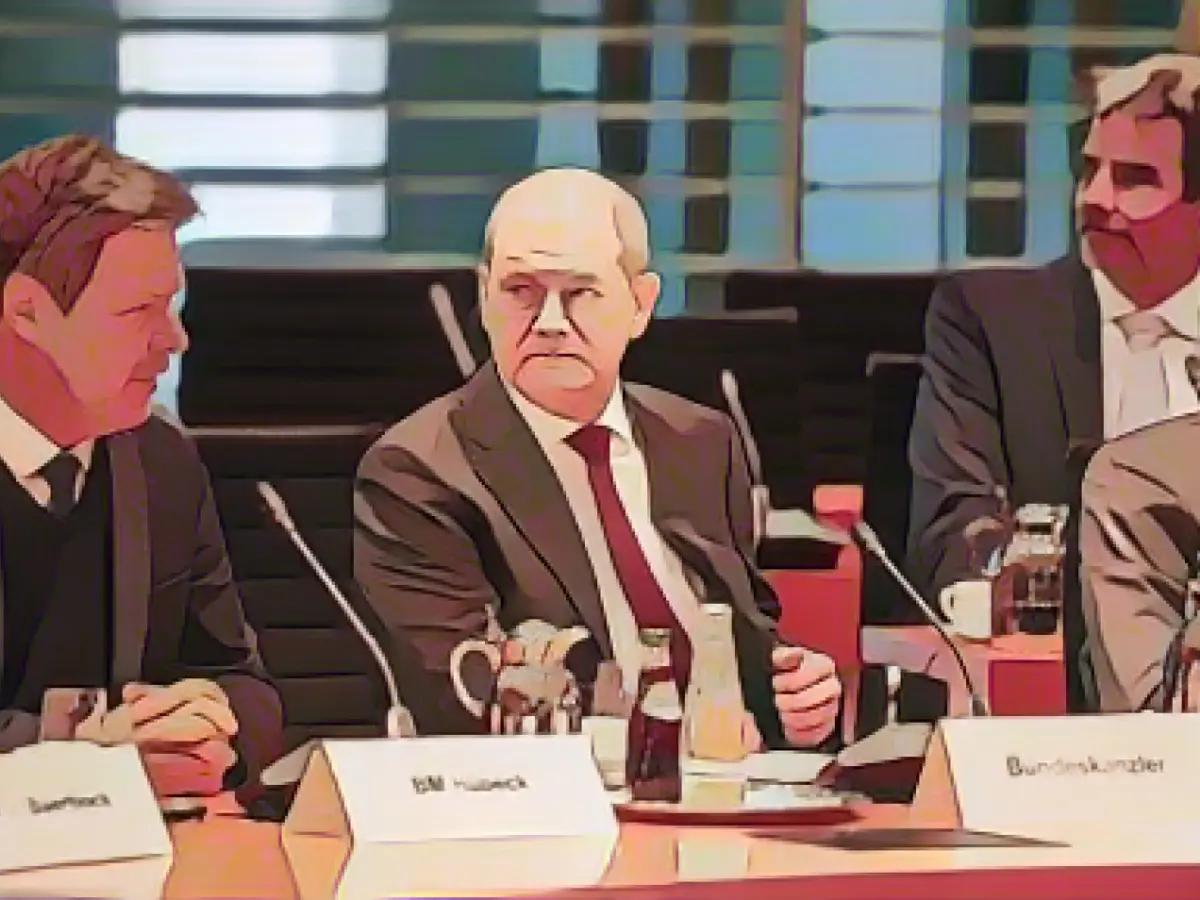Budget Wrangling in Germany: Coalition Chaos Continues Over Spending Plans
Germany's budget woes show no sign of resolution, as Chancellor Olaf Scholz (SPD), Vice-Chancellor Robert Habeck (Greens), and Finance Minister Christian Lindner (FDP) remain entangled in a power struggle over the country's 2024 spending plans. Despite numerous days of secretive negotiations, an agreement has yet to materialize. The federal government has scheduled a cabinet meeting for Wednesday, but the budget issue remains uncontested on the meeting's agenda as of Tuesday evening.
Two possible alternative methods for adopting the budget this year include the cabinet endorsing the proposals during the meeting or making a decision via a circular resolution, which involves written authorization instead of official cabinet approval. In this scenario, the Budget Committee or Bundestag could discuss the matter during a special budget week nearby Christmas, perhaps with the Bundesrat providing its approval on December 22.
Germany's highest court handed down a ruling three weeks ago, declaring a budgetary allocation of 60 billion euros null and void. According to Finance Minister Lindner, approximately 17 billion euros are now absent from the federal budget for 2024. The allocated funding was intended for investments in climate protection and modernizing the economy during the coronavirus pandemic. The court also decreeed that the federal government could not repurpose loans approved in emergency situations for future use.
Simultaneously, the argument over the citizens' income persists, as coalition leaders attempt to arrive at a consensus on potential savings in social spending. The CDU/CSU has consistently advocated for adjusting the citizens' income to motivate employment instead of promoting inactivity. The Federal Employment Agency has stated that the scheduled increase in the citizens' income, set to occur in January 2024, cannot be retracted due to technical limitations, as the payment processes have already begun.
Meanwhile, the FDP has advocated for reevaluating the standard rates for the citizens' income in light of inflation slowing down. FDP parliamentary group chairman Christian Dürr has proposed budgetary cuts in 2024 if the citizens' income increase exceeds inflation rates and suggests the possibility of a "zero round" for 2025.
Insights:
- The coalition government had utilized special off-budget funds, such as the "Fund for Transformation and Climate," to finance green investments during the pandemic. However, the Federal Constitutional Court determined that such moves exceeded the limits of the debt brake rule, which restricts the structural budget deficit to 0.35% of GDP.
- The differing fiscal policies between the SPD and FDP, particularly their stances on the debt brake, have further complicated negotiations. The FDP insists on adhering to the debt brake, while the SPD and Greens advocate for its relaxation or reform to accommodate increased spending on defense, infrastructure, and social welfare.
- Budget deliberations between the SPD, Greens, and FDP have been ongoing without resolution, damaging the country's financial stability and economic confidence.
- The cabinet meeting on Wednesday offers a potential pathway to a budget decision, as the debate between the coalition leaders continues.
- The 17 billion euro shortfall in the federal budget, caused by the Federal Constitutional Court's ruling, creates significant financial challenges for the German government.
- The Budget Committee or Bundestag could deliberate on the matter during a special budget week before Christmas, with the Bundesrat granting its approval on December 22, if the cabinet approves the budget plans.
- The CDU/CSU and the SPD have differing perspectives on the citizens' income, with the former advocating for adjustments to discourage inactivity and the latter contending that mandatory payments have already commenced.
- The FDP has called for a review of the standard rates for the citizens' income due to inflation deceleration, proposing budgetary savings if necessary.
Source:
Enrichment Data:
- The SPD, Greens, and FDP were previously part of the previous governing coalition, which collapsed in November 2024 due to disagreements over the debt brake rule and budgetary policies.
- The debate over the debt brake rule had been a point of contention between the parties since the establishment of the current coalition in December 2021.
- The Federal Constitutional Court's decision on November 15, 2023, stated that the use of a special off-budget fund was unconstitutional, significantly impacting the government's financial architecture. The ruling restricted the coalition's ability to circumvent the debt brake rules in times of crisis.
- The FDP has been critical of the SPD and Greens' budgetary proposals, viewing them as irresponsible and unsustainable in the long term. The FDP maintains that compliance with the debt brake is essential for safeguarding Germany's financial stability.
The ongoing budget negotiations in Germany between the SPD, Greens, and FDP are fraught with disagreements and uncertainty, stemming from differing fiscal policies and the impact of the Federal Constitutional Court's ruling. As the coalition leaders continue their power struggle over the 2024 spending plans, the financial stability and economic confidence of the country hang in the balance.








